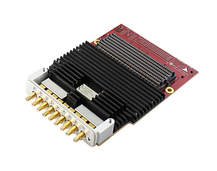
The FMC134 provides customers with a high bandwidth and high channel count I/O solution that is ideal for multi-channel receivers in a wide range of applications.
With four 12-bit analog-to-digital channels up to 3.2GSPS or two analog channels up to 6.4GSPS, the FMC134’s design is based on the Texas Instruments™ ADC12DJ3200 and is mechanically and electrically compliant with the FMC+ standard (VITA 57.4), the next generation of small form factor expansion I/O for high performance FPGA-based systems.
The A/D JESD204B data interface connects to an FPGA using 16 of the 24 high speed serial lanes available on an FMC+ high serial pin count (HSPC) connector. The unused eight high speed serial lanes are passed to the top of the board, enabling the potential for FMC stacking.
The sample clock can be supplied externally through a coax connection or supplied by an internal clock source (optionally locked to an external reference) for multi-board and multi-channel synchronisation.
The board also includes an external trigger input and two reference outputs that can be enabled for multi-board synchronization.
The front panel I/O can optionally be populated with MMCX or SSMC coaxial connectors. Analog I/O is AC-coupled.
When paired with the latest FPGA carrier cards with FMC+ sites - such as the Abaco 3U VP880 or the 6U VP868 with Xilinx® Ultrascale™ technology - customers can implement high performance algorithms on an industry standard platform.
More information on the FMC134 can be found here.
Other FMC Cards can be found here.
More information on Abaco's FPGA cards can be found here.
With four 12-bit analog-to-digital channels up to 3.2GSPS or two analog channels up to 6.4GSPS, the FMC134’s design is based on the Texas Instruments™ ADC12DJ3200 and is mechanically and electrically compliant with the FMC+ standard (VITA 57.4), the next generation of small form factor expansion I/O for high performance FPGA-based systems.
The A/D JESD204B data interface connects to an FPGA using 16 of the 24 high speed serial lanes available on an FMC+ high serial pin count (HSPC) connector. The unused eight high speed serial lanes are passed to the top of the board, enabling the potential for FMC stacking.
The sample clock can be supplied externally through a coax connection or supplied by an internal clock source (optionally locked to an external reference) for multi-board and multi-channel synchronisation.
The board also includes an external trigger input and two reference outputs that can be enabled for multi-board synchronization.
The front panel I/O can optionally be populated with MMCX or SSMC coaxial connectors. Analog I/O is AC-coupled.
When paired with the latest FPGA carrier cards with FMC+ sites - such as the Abaco 3U VP880 or the 6U VP868 with Xilinx® Ultrascale™ technology - customers can implement high performance algorithms on an industry standard platform.
More information on the FMC134 can be found here.
Other FMC Cards can be found here.
More information on Abaco's FPGA cards can be found here.
